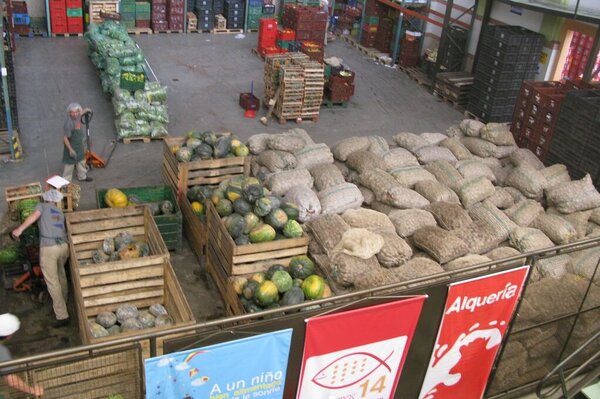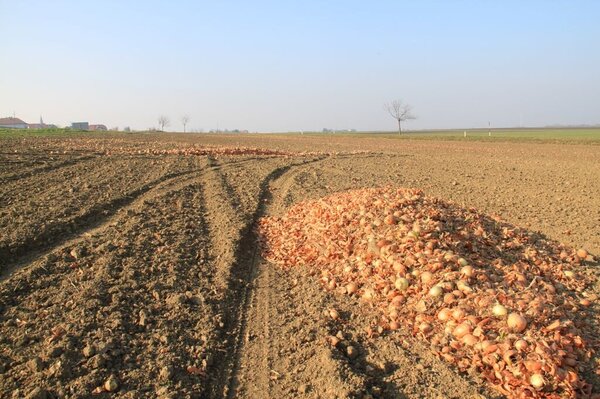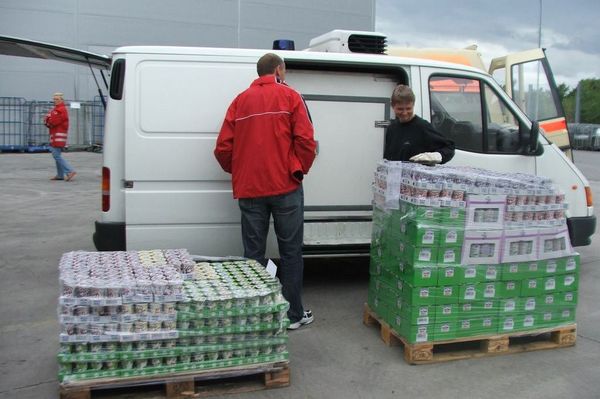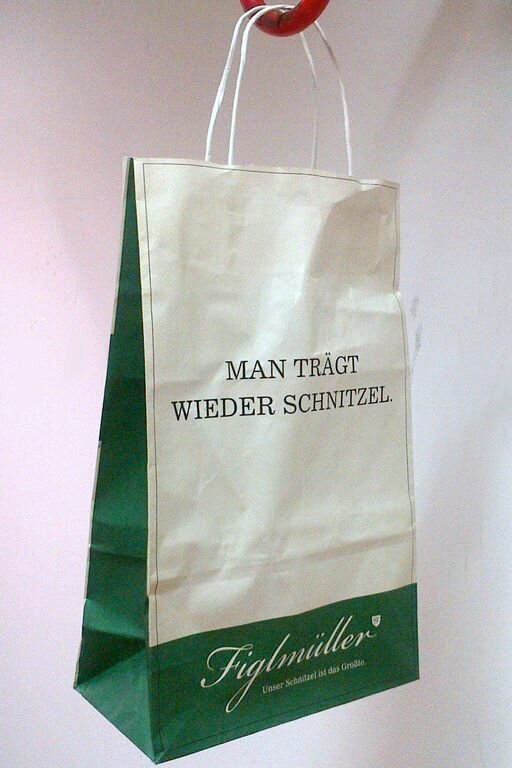Expertise
How food loss and waste can arise
Felicitas Schneider | 10.06.2024
An average foodstuff goes through about 33 hands before it can be inspected by the customer in the supermarket. Well-coordinated flows of goods enable a smooth process. Sometimes, however, a stone comes into the gearbox. This can also lead to food losses and waste.
The difference between the best before date and the use by date
Since December 13th, 2014, the EU Regulation 1169/2011 has regulated uniform labelling of (packaged) foodstuffs within the European Union as information for consumers. Among other things, the Regulation also defines the terms "date of minimum durability" (in practice known as best before date) and "use by date". -
- According to this definition, the date of minimum durability of a foodstuff is the date until this foodstuff retains its specific properties if properly stored. The specific properties vary from food to food and may include, for example, the loud cracking of a biscuit when it is bitten into. If the date of minimum durability of a food product is reached or exceeded, the manufacturer no longer guarantees its specific property. This means that the biscuit may also be eaten noiseless after that date.
- In the case of foodstuffs which are highly perishable from a microbiological point of view and which may constitute an immediate danger to human health after a short period of time, the date of minimum durability shall be replaced by the use by date. At this date, the foodstuff is considered unsafe which means that it may affect human health. Sensitive foods such as fresh meat or fish are marked with the use by date.
Certain foods are excluded from the indication of the date of minimum durability, e.g. fresh fruit and vegetables that have not been pre-processed, beverages with an alcohol content of 10 % or more by volume, bakery products (normally eaten within 24 hours of production) or cooking salt.
Many different resources are needed to produce food:
- The soil must be suitable for the selected seed and be available in sufficient area.
- Sufficient water, sun, heat and nutrients at the right time are basic prerequisites for the healthy growth of plants and animals.
- The farmer needs experience in how to care for his plants and animals in order to achieve a good yield.
- At harvest time, all factors such as harvesting technology, weather and logistics must work together to actually bring this yield to the warehouse and the market.
Lack of demand and low product prices, lack of storage and cooling facilities, pest infestation and exaggerated demands on the appearance of agricultural products can lead to food not being harvested or not being marketed after the harvest. When was the last time you ate a two-legged carrot?
As early as 2013, scientists from the Thünen Institute prepared a first estimate of plant food losses in agricultural primary production (available in german only), exemplary for wheat, potatoes, apples and carrots. In the REFOWAS project (English summary available) they have investigated, among other things, how losses in primary production and storage can be avoided and how relations between farmers and trade can be positively influenced to make better use of food.
We illustrate reasons and measures against food waste and loss in German primary production and food processing sector in this Working Paper 209 (in German) which includes an English abstract. Our experiences targeting fruit and vegetable losses in Germany, potato losses at harvest as well as persimmon losses at harvest and storage have been published in international journals.
In cooperation with partners we develop optimised grain storage structures that combine product-specific advantages of underground hermetic storage and aspects of sustainability. The ongoing project will contribute to reduced storage losses as well.
You can find further insights on the impact of retailers’ product standards on food loss summarised here. The full report in German with English abstract can be found here.
In this video we explain our cooperation with retailers to reduce these losses.
Our research activities also cover loss reasons and prevention options at the interface of different actors. Another publication addresses the impact of market power on food loss at the producer-retailer interface.
Modern technology supports the safe and hygienic processing of food - but sometimes it also makes mistakes.
Incorrect machine settings and inadequate warehouse logistics can contaminate, pack poorly or damage food during or immediately after production. The best before and use by date are also an important factor in the supply relationship between producers and retailers.
The best-before date set by the producer must cover the entire period between production, the producer's storage and the delivery to the retailer, the storage on the supermarket shelf and the purchase and consumption by the consumer. In the first third of this period, the producer should deliver the goods to the retailer. If the producer puts too much goods in stock and does not sell them to the trade in time, the latter usually does not accept the goods anymore.
The affected foods, which, depending on the product group, still have weeks (e.g. dairy products) or months (e.g. frozen products, beverages) to reach the best-before date, are therefore considered unsaleable. Most of them are disposed of but are now also donated to social institutions - as can be seen in the photo.
Together with project partners, scientists from the Thünen Institute conducted research in the REFOWAS project (English summary available) on measures in processing companies to reduce surpluses in bread and baked products.
The ELoFoS project of the Thünen Institute of Market Analysis is investigating, among other things, the interfaces between suppliers of fish products and sausage and meat products and the hotel industry. Which optimisation is possible through different degrees of convenience of the products in terms of food waste? Practice-oriented solutions are being developed together with the project partners.
We illustrate reasons and measures against food waste and loss in German primary production and food processing sector in this Working Paper 209 (in German) which includes an English abstract.
Do you know this? "Does the father say to the waiter: Can you please pack the leftovers for the dog? Then the son to the father full of expectation: We finally get a dog?“
XXL portions are widespread in catering trade in Germany. But who dares to have leftovers packed up for them? Many people interpret this as unpleasant and they feel stingy. So the dog is pushed forward. Stand by to have leftovers wrapped up for later enjoyment!
Other customers tend to overcrowded plates at "All you can eat" buffets. Why not take the opportunity to go to the buffet several times and enjoy the cozy taste of the offer? Less remains on the plate if it should not taste - and it costs the same money.
Often too much food is ordered for business lunches and family celebrations. Open leftovers from buffets have to be thrown away for hygienic reasons. They can no longer be kept or passed on to other people. Some caterers, however, offer the possibility that you and your guests can pack up the leftovers and take them with you. Just ask!
A demand-oriented production and safe storage of food in company canteens, hospitals or hotels is a logistical challenge for the chefs and requires a lot of experience and information exchange within the company.
In the joint project REFOWAS (English summary available) with the North Rhine-Westphalian consumer advice centre, scientists from Thünen Institute researched how demand-oriented production and safe storage of food can be implemented in practice and how the economical use of food in out-of-home catering can be supported.
The ELoFoS joint project is also concerned with out-of-home catering. Efficient measures to reduce food waste are being investigated in canteen kitchens in the hotel and care sectors. For this task, the Thünen-Institute of Market Analysis, the Institute for Sanitary Engineering, Water Quality and Solid Waste Management at University of Stuttgart, the Maritim Hotelgesellschaft, the service company MediClin à la Carte as well as the suppliers Deutsche See and Wurst-Fleischwaren-Service have joined their forces. The outcomes and recommendations for action are summarised in this project brief. More details are provided in the full report in German. Our related scientific publication offers more insights on efficiency of different waste-tracking tools in food services.
The Thünen Institute contributes its expertise to the dialogue forum "Out-of-Home Catering", which was founded within the framework of the National Strategy, especially in the agreement of data provision for an improved monitoring. Since spring 2021, a target agreement has been in place between the BMEL and associations in the out-of-home catering sector. It provides a framework for the measurement and regular reporting of food waste in the sector. The implementation is supported by a cross-association competence centre, to which the Thünen Institute also belongs. Here you can read about the results achieved in company canteens through awareness-raising measures, smaller portion sizes and creative cooking.
The conference proceedings „Smart Waste“ focuses on the potential of digitalisation and internet of things in relation with food waste prevention in out-of-home in general and in specific for barracks canteens at the Austrian Armed Forces (in German only).
One of our representative studies focused on meat waste generated by German food service sector.
Read interesting facts about food waste in Swedish school canteens, the loss of nutritional value and the impact on the ecological footprint.










